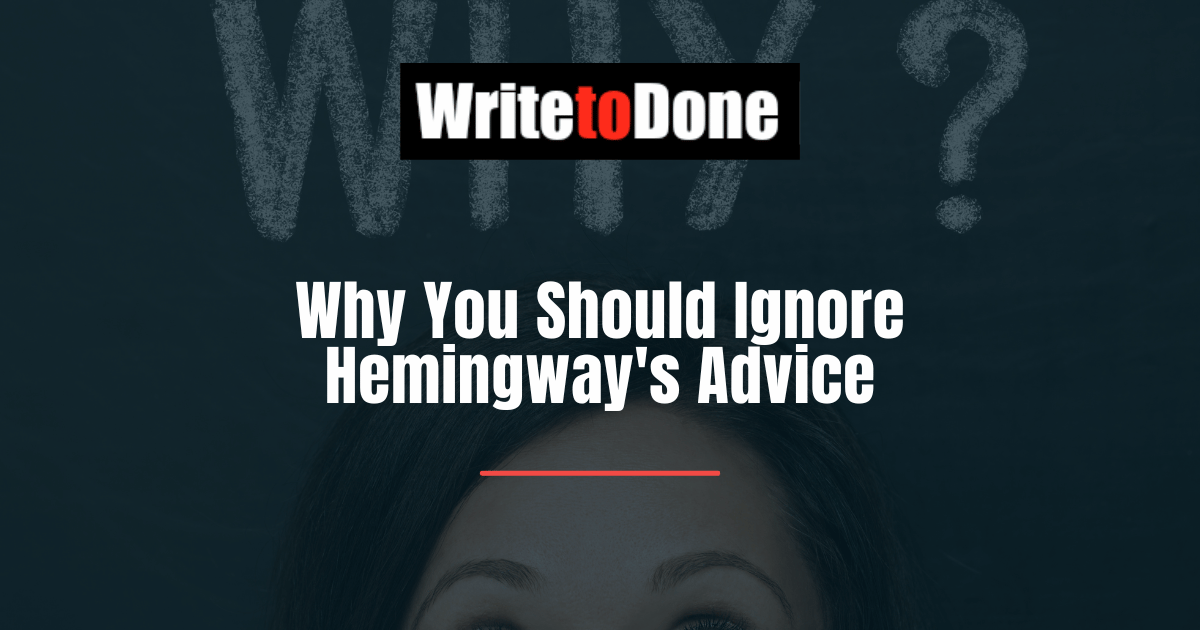“Wait… what? You want me to ignore advice from Hemingway and other great writers?”
Yep.
Now, I’m not talking about the kind of advice you get from a top-notch Creative Writing course or personalized feedback. Instead, I’m talking about the many, many quotes you see littering the internet from well-known writers saying something profound about their working process.
Something like this:
“There is nothing to writing. All you do is sit down at a typewriter and bleed.” – Ernest Hemingway.
I mean – sure. This quote is lovely. It captures all the romance of writing and makes a beautiful screen saver when made into an image.
But how useful is this advice in reality? Should you ignore Hemingway’s advice?
I mean, what publisher would even look at a stack of ink-stained, blood-soaked pages?
Let’s make this quote into real advice
Below, we’ll debunk some of the most well-known quotes on writing and get to the bottom of the real, gritty advice at the core.
Ready? Okay. Let’s start with that Hemingway quote…
#1: Blood is not an adequate substitute for ink
So, what is Hemingway really saying here?
We know that an awful lot of skill is needed to create something complete. So much in fact, that the fear of writing rubbish can sometimes put a blocker on your creativity.
Have you ever sat in front of a blank page and wondered what the hell you’re going to write?
Perhaps a better version of this quote is something like:
“There’s a hell of a lot to writing. But forget all of it during your first draft and just write the stuff that you’re most passionate about, in the most interesting way you can.”
After all, you’re probably going to be spending the next few years on the idea, if you’re writing a novel. It might as well be on a subject you love.
#2: You can’t pave a road with adverbs
This quote is plucked from Stephen King’s On Writing:
“The road to hell is paved with adverbs.” – Stephen King
Spoiler alert: Stephen King doesn’t like adverbs much. In fact, not a lot of people do.
But that doesn’t stop him from using them himself. When used correctly, adverbs can be heavenly.
So what should this quote be?
“Use adverbs sparingly.”
Now that’s advice we can use.
#3: Don’t write every part of your life into your book
I could fill several blogs like this just on Virginia Woolf, but this quote is perhaps my favorite:
“Every secret of a writer’s soul, every experience of his life, every quality of his mind, is written large in his works.” – Virginia Woolf
I’m not sure about you, but 99% of my life is pretty boring. I mainly think about what snacks I can sneak into my writing den.
Rather than writing every experience in LARGE FONT in the middle of your novel, perhaps do something like the following instead:
“Use your own human experience to make your writing real.”
Even if your story is set on Mars, you can draw upon your own memories and emotions to make that alien truly relatable to your reader:
“Read the way he twists his hands as he talks! I do that when I’m nervous, too.” – For example.
#4: A novel with too many slain darlings is a gruesome one
Perhaps the most famous writing quote of them all:
“In writing, you must kill all your darlings.” – William Faulkner
A ‘darling’, is that lovely snippet of writing you are really proud of. The line that you think might even make a damn good screensaver one day.
It’s true that too many darlings will slow down your plot and stick out like sore thumbs.
But kill them all? Really?
How about this instead:
“If something on your page doesn’t belong there – slay it with no remorse.”
If it fits – keep it in.
#5: Without law, there’s chaos
We’ll finish with a good one:
“There are no laws for the novel. There never have been, nor can there ever be.” – Doris Lessing
If you’ve ever read a good dystopian novel, you’ll know that all hell can break loose if there are no laws.
It’s the same with a novel.
The thing is, there are laws to writing a novel. Without them, books would mainly be a stream of consciousness with no real plot or character.
But there isn’t just one law that governs every book. And sometimes, great things happen when you break them.
So perhaps Doris Lessing’s advice should be altered to the following:
“Know the laws for a novel before you break them – and be clear why you are.”
A novel that follows the ‘rules’ for great characters, doesn’t always need to follow an Aristotelian plot. Some readers will be happy to just spend time with them.
So, there we have it – 5 quotes from famous authors that you can feel okay about ignoring. Or at least take with a pinch of salt.
As writers, we need to learn as much as we can from the greats before finding our own way of doing things – which is why sites like this one are so important. Hopefully, when you’re a famous author, you’ll then be able to give out your own advice for other writers to ignore.
As Carl Sandburg once said:
“Beware of advice—even this.” —Carl Sandburg
What famous author quotes would you change? Leave your thoughts as a comment below.
And please share this post with your friends on social media!
















